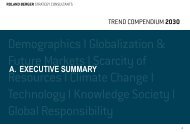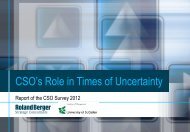issue 1 - Roland Berger
issue 1 - Roland Berger
issue 1 - Roland Berger
Create successful ePaper yourself
Turn your PDF publications into a flip-book with our unique Google optimized e-Paper software.
p food for thought<br />
ethics and management<br />
to contribute to their communities and uphold<br />
human rights. The Ethics Standard of<br />
Excellence is intended to ensure that all<br />
employees are provided with comprehensive<br />
training and health care coverage, as<br />
well as a humane work environment, fair<br />
compensation and environmentally sound<br />
operations. “The ICCA wants to express<br />
these principles in terms of balance-sheet<br />
items to show companies the impact of<br />
their behavior,” says Steiner, who since<br />
June has also been advising the United<br />
States government on cultural and ethical<br />
matters. The professor recommends that<br />
companies create an ethics board to introduce<br />
the code of conduct in order to ensure<br />
that employees are qualified and in compliance<br />
with standards.<br />
“Credibility and growth”<br />
<strong>Roland</strong> <strong>Berger</strong>, founder and chairman of the supervisory board of <strong>Roland</strong> <strong>Berger</strong> Strategy<br />
Consultants, believes that ethical behavior is absolutely essential for companies today.<br />
His advice: The more credible a company’s actions are, the greater its growth opportunities.<br />
THINK: ACT Mr. <strong>Berger</strong>, when it comes to<br />
corporate decision-making, is it possible<br />
to act in a consistently ethical manner, or<br />
does that conflict with the profitability<br />
principle?<br />
ROLAND BERGER One can act ethically, and<br />
one must do so. Companies today are closely<br />
<strong>Roland</strong> <strong>Berger</strong>, consulting company founder<br />
scrutinized in terms of what they do, how<br />
they do it—and often also where they do it.<br />
Issues that relate to subjects such as quality,<br />
product safety, employee relations, corporate<br />
commitment and environmental considerations—anywhere<br />
in the world, as it happens<br />
—are openly discussed and analyzed without<br />
individual companies really having any influence<br />
over the respective evaluation criteria.<br />
The more a company displays ethics and<br />
credibility, the greater its opportunities for<br />
growth are.<br />
So are ethics indispensable?<br />
Absolutely! If customers or employees are not<br />
happy with what they find at a company,<br />
they may very well vote with their feet. Those<br />
consequences will be quickly reflected in the<br />
company’s performance on the stock market.<br />
That’s tremendous leverage.<br />
In your opinion, what are the pillars<br />
of corporate ethics?<br />
First of all, a company needs a set of values<br />
that it stands for and advocates. However,<br />
most corporate visions and mission statements<br />
are market- and not value-related.<br />
Second, it needs a clear statement on how it<br />
plans to achieve its objectives. This statement<br />
will also determine which procedures it will<br />
pursue or exclude. Third, there must be principles<br />
in place that govern internal processes<br />
and their interactions. Fourth, you need<br />
clearly delineated responsibilities. Rules and<br />
individual obligations should be monitored.<br />
Companies often lack this culture of responsibility—meaning<br />
you don’t have to look far to<br />
see why there is a lack of credibility.<br />
Management’s reputation is affected by a<br />
few, highly visible cases. Can ethical management<br />
remedy this type of situation?<br />
In many countries, there have been some very<br />
clear cases of management failure that, in the<br />
public eye, have been more influential than<br />
the proper ethical behavior displayed by the<br />
vast majority of companies out there. It takes<br />
consistently unimpeachable behavior as well<br />
as openness and communication to survive<br />
this type of situation. Ethics is not just about<br />
having values, it’s also about conveying<br />
them, both within the company and to the<br />
public. That way, should a company find<br />
itself dealing with a crisis, it will have a<br />
credible base from which it can believably<br />
defend its actions.<br />
16<br />
think: act
















